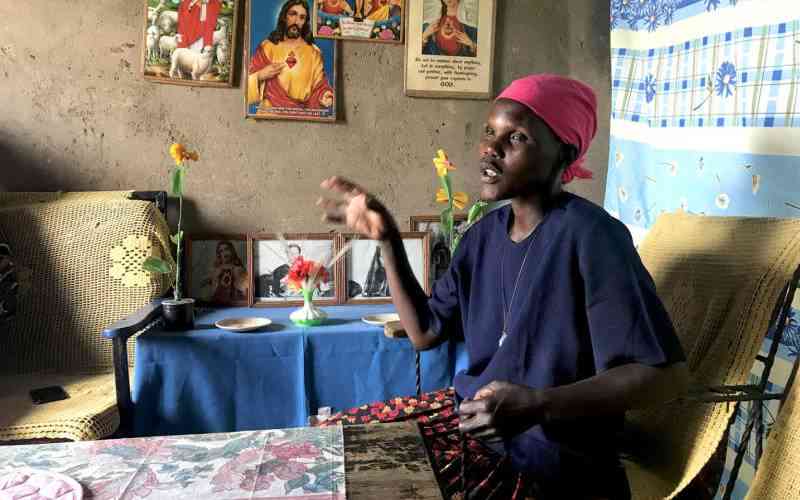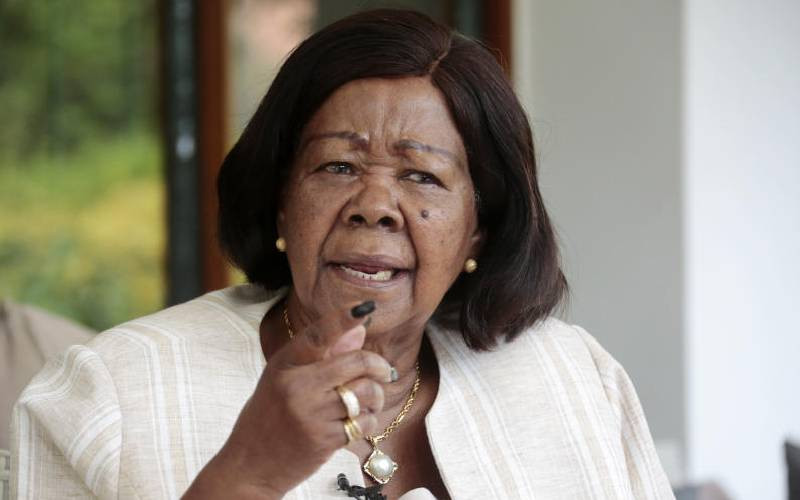Alice Kahaki, a renowned businesswoman in Nakuru, died on August 25, 1983, triggering a succession case initiated by her daughter Elizabeth Wanjiku.
In her submission before the High Court, Wanjiku claimed that her late mother owned 95 per cent of the family estate, estimated to be worth over Sh1 billion. Her father Philip Kamau, she told the court, owned only five per cent.
Wanjiku has been in court fighting for her mother’s rights up to date, with documents showing that the majority of the family property was registered in her father’s name and not her mother’s.
It was her submission that her mother, a businesswoman, used her business income to purchase land, but the same could not be registered under her name by then.
“My father Kamau was only a civil servant and could not afford properties. However, the culture and norms then, could not allow land to be registered under my mother’s name because she was the subject of my father,” she deposed.
She claimed that her father not only disinherited her sisters and herself but gifted the estate to her brother Joseph Njuguna to administer.
The estate includes a slaughterhouse, the famous Pinkam House, the Molo House, a funeral home, a business centre, apartments, and farms.
She wants the court to separate her mother’s estate from that of her father, to ensure her sisters who were left out of their father’s will get something.
In neighbouring Kisumu, Achieng Juma thought her life had changed in 2012 when her husband Yusuf Juma died.
The mother of seven had a piece of land to grow crops and shelter her family but only did so for one year.
In 2013, her eldest brother-in-law insisted that she gets inherited, a customary practice among the Luo people.
Traditionally, widow inheritance meant re-marrying an in-law whose role was to provide for and protect the family.
When she refused, the in-law said she would bring a curse upon the family. He demolished her house, claimed her land, sold her belongings, and sent her and her children away.
“I found a small one-room house near the local market where I live with my children. I work as a casual labourer, weeding farms and selling charcoal and doughnuts to support my family,” she said.
Stay informed. Subscribe to our newsletter
Despite her case being referred to mediation and resolved after her in-law understood her right to own land, Achieng has no funds to rebuild her demolished home.
Susan Nyambura died on February 5, 2025, aged 73. After 24 years in court, Nyambura was unable to enjoy her late husband Joseph Leitmann’s estate in Nakuru.
Since they met in the 1960s, none of Leitmann’s property was registered in her name, despite living together for over 30 years, before Leitmann died on August 3, 2021.
Nyambura’s battle to own half of the estate took 24 years in court. In December 2023, the court ruled that she was entitled to inherit half the estate.
However, despite the verdict, she was blocked from inheriting the estate, and to her death, she never occupied land rightfully belonging to her.
“The family was forced to bury her at one of her cousin’s lands. She has suffered while fighting for her rights but she has not enjoyed it,” said Nyambura’s lawyer Judith Kamoing.
According to Kamoing, Nyambura’s 17-year-old daughter is also at risk of not inheriting the estate, since she has not been listed as a beneficiary in the same.
In Uasin Gishu County, Rose Rotich, a mother of six, was in June 2021, kicked out of her matrimonial home in the county by her brother-in-law Elias Kiplagat.
The house was demolished, rendering her homeless.
Ms Rotich alleged that she owned 26 acres but the in-law, using her husband’s documents, sold 17 acres without her consent.
Divide estate
“My husband entrusted Kiplagat as the caretaker of his estate, but he took advantage of my husband’s death to sell the land,” she stated.
In Nairobi, Margaret Wanjiru spoke last year of her 20-year court battle with her brothers over inheritance.
She said despite her parents wishing that they equally divide the estate, her attempts to demand her share were met with rejection, creating enmity based on culture and norms.
The succession case is still pending.
“Sometimes, a woman just needs to know that if things go wrong out there and in her marriage, she has a home she can go to as a last resort,” Wanjiru submitted.
The 2010 Constitution protects women’s rights to land and property and recognizes culture and customary practices that do not infringe on protected rights. However, the same is abused.
Research by the Kenya Demographic and Health Survey (KDHS) in 2024, reveals that women face significant bias in land ownership and control, owing to the entrenched male-controlled system in communities.
The research attributes the decline in land ownership for women to existing discriminatory customary laws and practices, marital status, and age, among others.
KDHS statistics show that in 2014, 61.3 per cent of women aged 15 to 49 did not own any land. The percentage increased to 75 per cent for agricultural land and 93.3 per cent for non-agricultural land in 2022.
“Among women who owned land in 2022, 62 per cent and 44 per cent did not have a title deed on agricultural and non-agricultural land, respectively,” reads the research.
Further, data from the Kenya Land Alliance (KLA) 2018 report shows that the government issued only 10 per cent of the 3 million title deeds between 2013 and 2017 to women.
“Given that women make up 50.3 per cent of Kenya’s population, excluding them from land ownership impacts the country’s economic performance,” the research states.
Data from the KDHS 2022 survey reveals that only 10.7 per cent of divorced and separated women own land, widows formed 48.6 per cent of land ownership while married women formed 39.4 per cent.
Political analyst Gitile Naituli says that politics, which is responsible for policy making, has a lot to do with women’s difficulty in owning or inheriting properties.
“Laws have been made, favouring men, and although some of them have been reversed to suit women, there is a lack of implementation mechanism,” Prof Naituli said.
Naituli said the culture which favours men has also contributed. According to Naituli, women who suffer the most are those who enter marriages.
“Many parents assume that their daughters will get married and inherit their husband’s properties and they therefore do not consider them in their wills,” he said.
Naituli says that land and inheritance disputes have triggered many court cases where women give up and end up surrendering their share because of case delays.
He insisted that policy should be made to ensure succession and land disputes are concluded within months.
“Parents are responsible for their children and they should make sure their daughters are allowed to inherit their land,” he said.
Naituli says that the biggest issue was in the ancestral land which has always been known to belong to men.
Lawyer Wangari Mwangi says that the Law of Succession Act does not differentiate between male and female children and upholds the principle of gender equality.
She says the law stipulates that regardless of gender, Kenyans have an equal right to inherit properties from their parents.
Further, she notes that the law also protects the right of married and unmarried women in inheritance and land ownership and there is no discrimination.
She, however, notes that there are few laws governing the ownership of land by young women, especially when their parents are still alive.
“Unfortunately, in the course of our practice, some traditions still believe that women or daughters who are married should live in areas where they are married and leave inheritance to their brothers,” she noted.
























